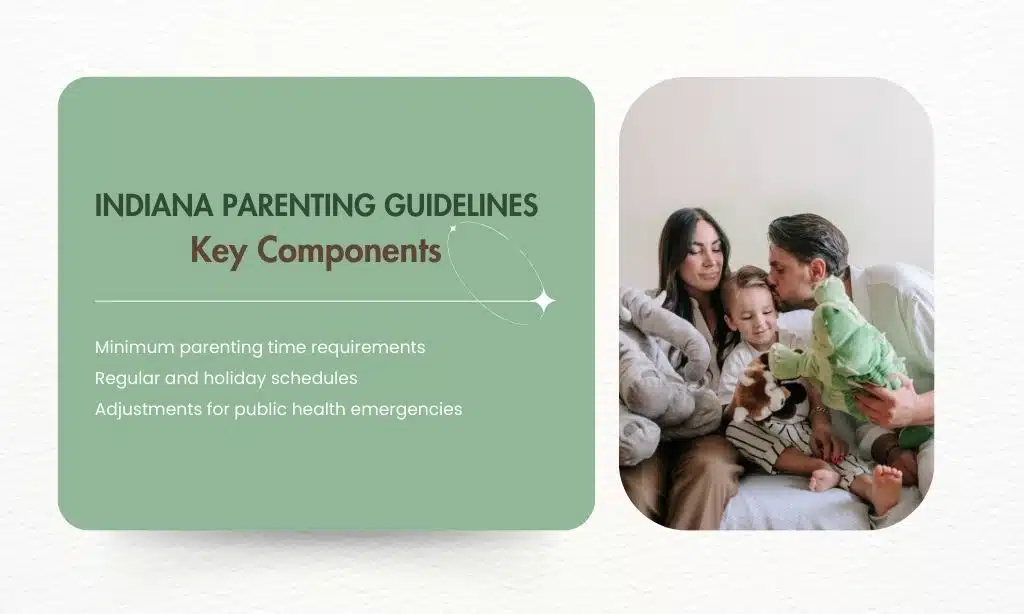Dealing with child custody? You’re not alone. Many parents face challenges when figuring out how to share time with their kids after a split. The Indiana Parenting Time Guidelines offer a way to make this easier.
They help ensure kids keep in touch with both parents, which is good for them.
The Supreme Court of Indiana made these rules. They say that even if parents can’t agree, there’s a basic amount of time that the parent without custody should see their child. This blog will show you how these guidelines can solve common problems like scheduling regular days and holidays or changing plans when needed.
Keep reading—it gets easier!
Overview of Indiana Parenting Time Guidelines
The Indiana Supreme Court made rules called the Indiana Parenting Time Guidelines. These rules help kids keep in touch with both parents often and in meaningful ways. A group named the Domestic Relations Committee made these guidelines, and the Judicial Conference of Indiana agreed they were good.
These guidelines are for all kids and parents, except when there’s family violence or big risks to safety.
These guidelines say how much time kids should spend with each parent. They don’t change old court orders unless a judge decides to update them. Even if the rules change, it doesn’t mean that parenting time orders will automatically adjust—parents might have shared parenting or one parent might have more custody based on what’s best for the child.
Key Components of the Guidelines
The key parts of the Indiana guidelines make sure parents spend enough time with their kids. They include rules for everyday visits, special days like holidays, and what to do if people get sick and public health orders change things.
Minimum parenting time requirements
Indiana rules say that both parents should see their kids enough. They set the least times a noncustodial parent can visit. This makes sure kids and parents stay close, even if they don’t live together.
Parents must follow these times or explain why in writing if they can’t.
These rules help when parents plan visits. If a visit gets missed, they have to make up for it later. Excuses like being sick, having other plans, or bad weather won’t stop visits.
This is all part of keeping the child’s best interests first.
Regular and holiday schedules
Creating a parenting time calendar helps parents plan for holidays and special occasions. This plan makes sure kids spend time with both parents throughout the year.
Here’s a list of how regular and holiday schedules work:
- Parents split the year into two parts. They take turns having the kids during major holidays.
- Each parent gets time with the kids on their own birthdays.
- Mother’s Day is spent with the mom, and Father’s Day is spent with the dad, no matter whose day it is in the regular schedule.
- Winter break from school gets divided in half. Kids spend one part with one parent and the other part with the other parent.
- Spring break rotates between parents each year.
- Summer break allows for extended time with each parent, often several weeks at a time.
- Other special days like Easter, Thanksgiving, and kid’s birthdays are shared or alternated yearly.
- Public health crises might cause changes to these plans to keep everyone safe.
- Parents need to agree on pick-up and drop-off times for each visit.
- They must inform each other if they can’t care for the kids at their scheduled time—a rule known as “right of first refusal.”
- Regular talks should happen at set times without interrupting each other’s time with the kids.
This setup ensures children have meaningful relationships with both parents all year long, balancing regular life and special moments fairly between homes.
Adjustments for public health emergencies
Public health emergencies change how we live. They also change how parents share time with their kids. Here’s what happens during these times:
- Parents need to be flexible. They might have to change their schedules.
- Safety comes first. If a child or parent is sick, they must stay apart until it’s safe.
- Communication is key. Parents should talk often and use email or phone calls to update each other.
- Use technology for visits. If in-person visits are not safe, parents can use video chats so the child and parent can still see each other.
- Follow legal steps if changes are needed for a long time. Sometimes, a parent may need to ask the court to change the parenting plan.
- Cooperation helps everyone. Working together makes things easier for both parents and kids.
- Planning for emergencies is smart. Parents can make plans ahead of time, just in case another public health emergency happens.
- Keep kids informed in simple ways about what’s happening without making them worried.
During these times, adjusting plans is necessary but always focusing on what’s best for the child helps make tough situations a bit easier to handle.
Common Parenting Time Schedules in Indiana
Indiana has several plans for parents to share time with their kids. These include splitting weeks, rotating every other week, or adding days to weekends. Each plan helps keep strong bonds between parents and children.
Plus, using online calendars makes it easier to follow these schedules. Want to find out which will work best for you? Keep reading for more insights on this topic.
2-2-3 schedule
A 2-2-3 schedule is a way for kids to spend time with both parents. It means the child lives with one parent for two days, then with the other parent for two days, and goes back to the first parent for three days.
Next week, they switch. This setup helps children feel at home in both places. It suits younger kids who need to see each parent often.
This plan works well under the “two houses, one home” model. It makes sure kids get equal time with each parent every week. Parents track this schedule using online tools or calendars on their phones or computers.
These help avoid confusion and make co-parenting smoother. The goal is always what’s best for the child, considering age and routine.
Alternating weeks
Alternating weeks are simple for parents and kids to follow. One parent has the child for a week, then the other parent takes over next week. This keeps things clear and avoids mix-ups with schedules.
Parents can plan their time around this schedule easily. It suits older kids well because they can keep up with where they will be each week.
This schedule works best when both homes are in the same area. It helps children feel stable and secure since they spend equal time with each parent. Kids adjust better when their routine is predictable, which is important for their emotional health.
The key is keeping communication open between parents to make sure everything runs smoothly.
Extended weekend options
Extended weekend options let parents spend more time with their kids. These can start on Friday and end on Monday. This way, both parents get to enjoy long weekends with their children.
It works well for those who live close by. Flexibility is a must here, especially during public health emergencies or school breaks.
Courts in Indiana urge parents to work together to make these extended weekends smooth for everyone. If a parent misses scheduled time because of something unexpected, they should try to arrange makeup days.
This keeps the child’s best interest at heart and supports a good relationship between the child and both parents.
Navigating Adjustments and Conflicts
Dealing with changes and disagreements is part of sharing parenting time. Spring break, holidays, and even unexpected events can mean parents need to adjust their schedules. They might use a calendar app or go through a lawyer to make these changes official.
When conflicts arise over weekend plans or holiday times, talking it out or getting help from a mediator are good steps to take.
Adjusting for Spring Break and other holidays
Adjusting the parenting time for Spring Break and other holidays needs planning. Parents should work together for their child’s best interests. Here’s how:
- Plan early. Talk about holiday plans a few months in advance.
- Use a year-long calendar. Mark all important dates, like Spring Break.
- Agree on fair time splits for the holidays.
- Think about your child’s needs first.
- Include special family times, like birthdays.
- Decide if each parent gets a full Spring Break or if you split it.
- Look at public health rules for safe travel during emergencies.
- Make-up days are needed if a parent loses holiday time with their child.
- Write down your plan to avoid confusion later.
- Use online tools to share and update the schedule easily.
Parents can change their plan as kids grow up or things change in life. Always keep talking and stay flexible for your child’s sake.
Resolving conflicts between regular and holiday weekends
Conflicts between regular and holiday weekends can make parenting time hard. Here are ways to solve these issues:
- Talk it out. Parents should discuss any schedule conflicts as soon as they know about them. This gives time to figure out a solution that works for everyone.
- Use a calendar. Mark all regular and holiday weekends on a calendar visible to both parents. This helps avoid misunderstandings.
- Mediators can help. If parents can’t agree, mediators step in. They listen to both sides and help find a fair solution.
- Look at the child’s needs. Always think about what is best for the child. Sometimes, staying with one parent during a special holiday makes more sense for the child.
- Flexible swaps work well. Be willing to trade days to solve conflicts without losing parenting time.
- Communication tools matter. Email or online tools made for co-parents allow clear talks without confusion.
- Update contact info regularly, making sure each parent knows how to reach the other easily.
- Private kid talks are key too, making sure kids feel okay talking privately with both parents no matter where they are.
Using these steps, parents can handle weekend conflicts better and keep things fair for the child and themselves.
Legal Support and Modifications
Changing the time you spend with your kids can be hard. You might need to change court orders as life changes. Lawyers and courts help make these changes. They look at what is best for the child.
Tools like family law software can also guide parents through this process, ensuring they understand each step.
Process for modifying parenting time orders
Parents often need to change their parenting time orders. Life changes, so the court’s orders may need updates too. Here is how it works:
- Check your current order. Make sure you know what it says about making changes.
- Talk to the other parent. You both might agree on the new terms without going to court.
- Write down your agreement. If you both agree, put it in writing and both of you should sign it.
- Get a lawyer if needed. Lawyers at places like Keffer Hirschauer LLP can help explain things and make the process easier.
- File a request with the court if you can’t agree. This tells the court you want to change the order.
- Explain why you want the change. The court will want to know why the old order doesn’t work anymore.
- Show how it helps your child. The court looks at what is best for your child above all.
- Be ready for a hearing. The court might ask both parents and other people questions.
- Follow new rules for money support if there are any changes because of more or less time with your child.
The law cares most about what helps kids grow up well and healthy, even when parents live apart.
Legal resources available for assistance
For parents facing custody issues, help is out there. Lawyers like those at Keffer Hirschauer LLP offer advice on parenting time and custody plans. They know the laws well. Mediation is another choice before taking court action.
It helps parents solve problems together.
If a parent needs to move, they must tell the other parent 30 days before moving. The law has rules for this to protect kids’ best interests. If someone breaks these parenting time rules, the court can take serious steps against them.
These steps are called contempt sanctions. This means the court makes sure everyone follows the orders about when a child sees each parent.
Using Technology for Co-Parenting
Tech makes sharing parenting time easier. Apps and online calendars keep both parents updated.
Parenting time calendars
Parents use parenting time calendars to plan holidays and special times. These calendars help keep schedules clear for both parents and kids. They can mark when each parent will have time with the child.
This makes sure children know what to expect.
Online tools make it easier to share these calendars. Both parents can see updates in real-time. This helps avoid confusion and conflicts over scheduling. It also lets each parent get school and health info on their own, keeping everyone informed.
Online tools for schedule management
Online tools help parents manage time easily. They use calendars and apps for this. These tools let both parents see their kids’ schedules. It makes planning easier. Parents can mark when they have their kids, add school events, and set up doctor visits.
Everyone stays informed without needing lots of emails or calls.
These apps also keep track of changes in parenting times, like holidays or unexpected events. If a parent can’t see their child as planned, they can ask for another day through the app.
This keeps things fair and clear. Plus, it cuts down on fights by keeping a record of all agreements.
Takeaways
Parenting time guides in Indiana help moms and dads figure out how to spend time with their kids after a split. These rules are there to make sure kids keep a strong bond with both parents.
They cover everyday visits, holidays, and even times like public health crises. Tools like calendars and apps can make sharing parenting duties easier. Facing changes or fights? Courts and legal helpers can guide you through fixing your schedule or solving problems.
This way, every child gets the love and care they need from both homes.






































